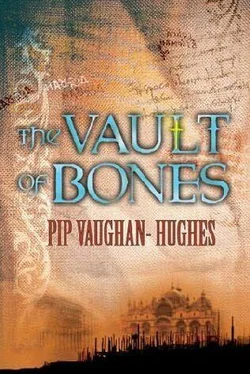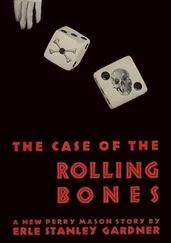Pip Vaughan-Hughes - The Vault of bones
Здесь есть возможность читать онлайн «Pip Vaughan-Hughes - The Vault of bones» весь текст электронной книги совершенно бесплатно (целиком полную версию без сокращений). В некоторых случаях можно слушать аудио, скачать через торрент в формате fb2 и присутствует краткое содержание. Жанр: Исторический детектив, на английском языке. Описание произведения, (предисловие) а так же отзывы посетителей доступны на портале библиотеки ЛибКат.
- Название:The Vault of bones
- Автор:
- Жанр:
- Год:неизвестен
- ISBN:нет данных
- Рейтинг книги:4 / 5. Голосов: 1
-
Избранное:Добавить в избранное
- Отзывы:
-
Ваша оценка:
- 80
- 1
- 2
- 3
- 4
- 5
The Vault of bones: краткое содержание, описание и аннотация
Предлагаем к чтению аннотацию, описание, краткое содержание или предисловие (зависит от того, что написал сам автор книги «The Vault of bones»). Если вы не нашли необходимую информацию о книге — напишите в комментариях, мы постараемся отыскать её.
The Vault of bones — читать онлайн бесплатно полную книгу (весь текст) целиком
Ниже представлен текст книги, разбитый по страницам. Система сохранения места последней прочитанной страницы, позволяет с удобством читать онлайн бесплатно книгу «The Vault of bones», без необходимости каждый раз заново искать на чём Вы остановились. Поставьте закладку, и сможете в любой момент перейти на страницу, на которой закончили чтение.
Интервал:
Закладка:
We walked for a long while, and the streets began to grow narrower and more down at heel. There was more life here. Workshops were already clanking and sawing away, children were running errands and even a few optimistic whores were seeing if anyone could possibly be in the mood, for it was going to be a lovely day, and what better way to begin it? But we pressed on until the acrid stench of boiling pitch began to sting our nostrils, and we knew we had reached our destination.
The Captain knocked four times on a door up a narrow alleyway no wider than a man. The door opened, and a black-swathed figure beckoned us inside. We found ourselves in a large room, very clean and bare, empty save for two old women sitting on a bench, and three men in plain black robes. Someone was leaving soon on a long journey, for saddlebags and a bedroll were lying by the door. The Captain exchanged greetings, while I hung back. The man who opened the door asked the Captain a question. He nodded, and the other man stepped back and spread his arms wide. His fellows did the same, and the Captain sank to the floor and prostrated himself. I heard murmured prayers in the soft, lilting tongue of Provence, and to my surprise it was the Lord's Prayer. I wondered if I should kneel as well, but felt awkward, and so remained standing.
The Cathars' prayers were at an end. The Captain was helped to his feet, and concerned questions were asked about his leg, his hip. He waved them off, and signalled to me. I undid my pack, and laid it on the ground. I drew out a plain box of ancient wood, shiny from centuries of touch. The Captain gave a nod, and I opened the lid and drew out a square of cloth, wide as a bedsheet, stained and yellow with age. He rose to his feet, and the cloth unfolded and rose with him. The men in the black robes gasped. They recoiled, and then one by one they came closer and examined the cloth. Now the women rose and looked also. They shook their heads in dismay, and one hugged the other, hiding her face in her friend's head-cloth.
The Captain laid his hand on my shoulder, and, very relieved, I hastily returned the cloth to its resting place and closed the lid.
Everyone stepped back, and the box was left: there in the middle of the floor. There was a long silence. The old women went back to their bench. Finally, the man who prayed took the Captain in his arms and they swayed together as they took their leave. I felt awkward once more, and offered my hand, which was shaken warmly. The other two men picked up the box gingerly, and I gave them my empty pack. The perfecti bowed once more, and the Captain gave a strange smile in which joy struggled with longing, and turned towards the door.
Outside, the streets were full of noise. The great Arsenal of Venice was about to give birth to another galley. We hurried down alleys and across bridges until at last we came out on to the wide seafront. We paused and looked at the ships, and began to stroll, easily, unburdened. We were almost at the palace of the Doges when the bells in the campanile of San Marco started to chime, a low, liver-shaking knell, and then every bell in Venice began to ring, until the very waters of the Lagoon were trembling, rilled by the throbbing waves of sound. It was Sunday, and away to the south, past the zone of war, past the disputed areas, across the mountains in Rome, the pope was rising, stiff and crippled, from his throne in the Lateran. In Venice, a Good Christian was setting off for his home outside Toulouse.
Leaning against the wall of the palace, Captain de Montalhac and I began to laugh. No one could hear us, and we stood there for a while in the sun, mouths open, eyes watering.
Is this really hell?' I asked the Captain, suddenly. He frowned, and then started to laugh again. A couple of Franciscans, late for Mass, scowled at us as they hurried by. – 'Oh yes’ he said at last. 'Yes, my friend. This truly is hell’
Historical note
This is a work of fiction, and as such is constructed from a jumble of what if?'s. But here are some facts: The Crown of Thorns was taken to Venice in 1237 by one Nicholas Querini as security for a debt of 13,134 pounds of gold. King Louis IX of France, through the agency of Andrew of Longjumeau and James of Paris, redeemed the Crown from Venice for 135,000 gold livres, half the annual worth of the kingdom of France. He built the Saint Chapelle in Paris to house it, and went on to buy most of the other items in the Pharos Chapel. Baldwin de Courtenay did not return to Constantinople until 1240. He was always desperate for money, and at one point was reduced to mortgaging his own son to Venice. John Vatatzes' successor finally took back Constantinople in 1261. The Franks had crippled Byzantium beyond repair, though, and it finally fell to the Ottoman Turks on 29 May, 1453 Baldwin spent the rest of his life as an emperor without an empire, wandering about the courts of Europe in the vain hope that someone would get Constantinople back for him. No one did. He died in Sicily in 1273. In 1238, the Abbot of San Giorgio Maggiore, Pietro Querini, obtained the body of Saint Eustichius from Constantinople. In 1310, the Querinis, together with the Tiepolos, attempted to overthrow the Venetian Republic and set up a despotate. Their rising failed, and the Querini Palace in San Polo was confiscated and turned into a slaughterhouse. The Mandylion of Edessa vanished sometime after the Franks sacked Constantinople in 1204. Nicholas Mesarites saw it in 1201, and Robert de Clari says it was in the Bucoleon Palace in 1205. Then it disappears from history.
Интервал:
Закладка:
Похожие книги на «The Vault of bones»
Представляем Вашему вниманию похожие книги на «The Vault of bones» списком для выбора. Мы отобрали схожую по названию и смыслу литературу в надежде предоставить читателям больше вариантов отыскать новые, интересные, ещё непрочитанные произведения.
Обсуждение, отзывы о книге «The Vault of bones» и просто собственные мнения читателей. Оставьте ваши комментарии, напишите, что Вы думаете о произведении, его смысле или главных героях. Укажите что конкретно понравилось, а что нет, и почему Вы так считаете.









